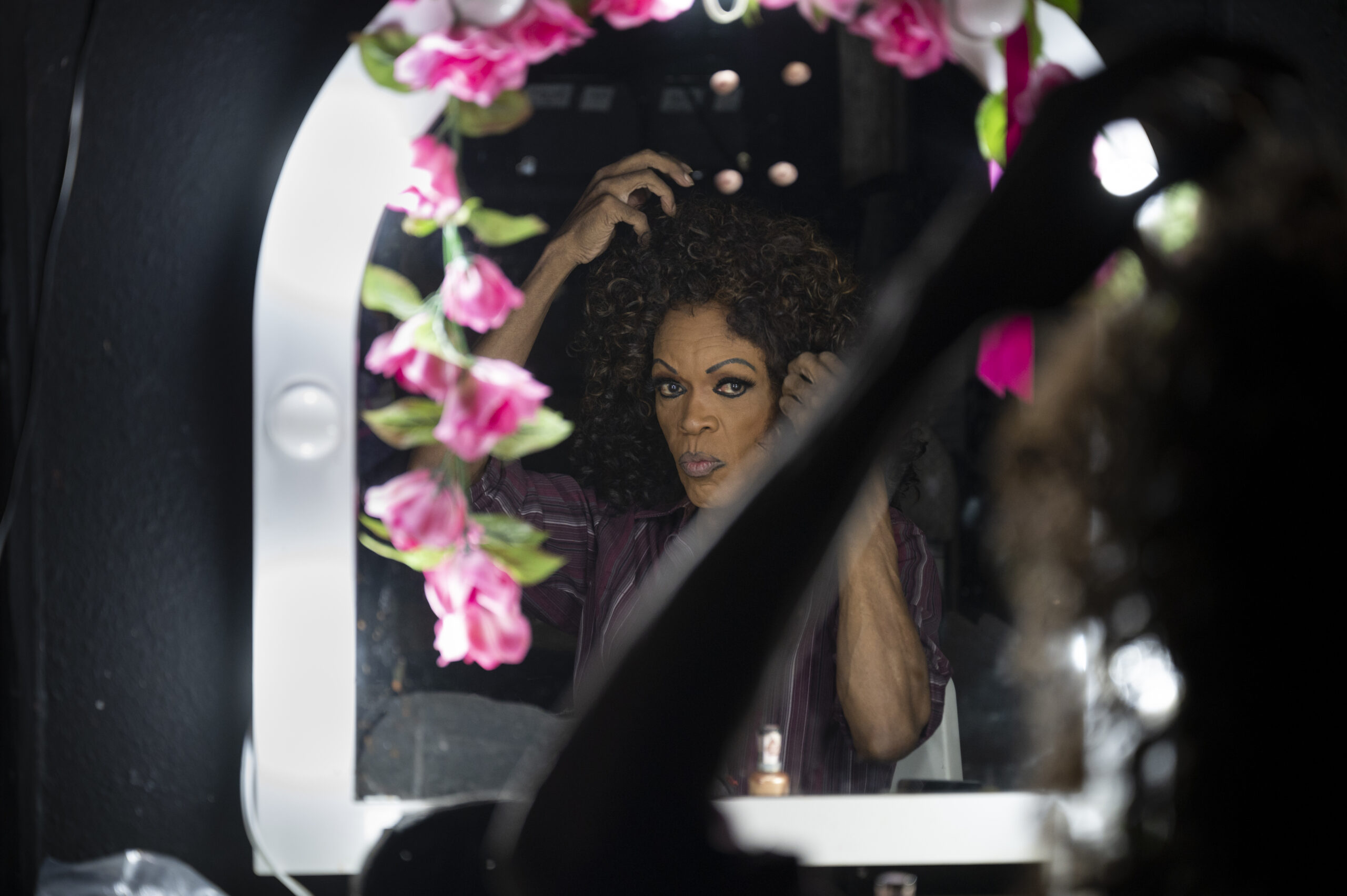In an orange prison jumpsuit and chains, a tall, lean drag queen writhed to a cover of “War Pigs” by Brass Against, which sounds like someone swapped Black Sabbath’s lead singer for a woman and added a highly caffeinated marching band. As she lip-synced, Hermajestie the Hung completed a dramatic strip tease down to an army fatigue jacket and fishnets, all to riotous cheers and a rain of dollar bills.
It’s April at the Swan Dive on Red River in Austin’s club district, where “Tuesgayz” night LGBTQ+ gatherings—which include “Queereoke” sing-along sessions—are a tradition. For over a year, the Black-led drag troupe Vanguard, with an informal membership of about a dozen performers that includes both drag kings and queens, has opened each show with the same invocation:
“On our stage we proudly proclaim that Black lives matter, trans rights are human rights, no human is illegal, all bodies are beautiful, and my body, my choice.”
Hermajestie—who described herself as a “postbinary, polyamorous, pansexual pot-smoking parent” and goes by “any pronouns but he/him”—explained later that she started each night the same way because she “realized that once I mention these things, the trash usually takes itself out.”
(We are using performers’ stage names in this article to protect their privacy.)
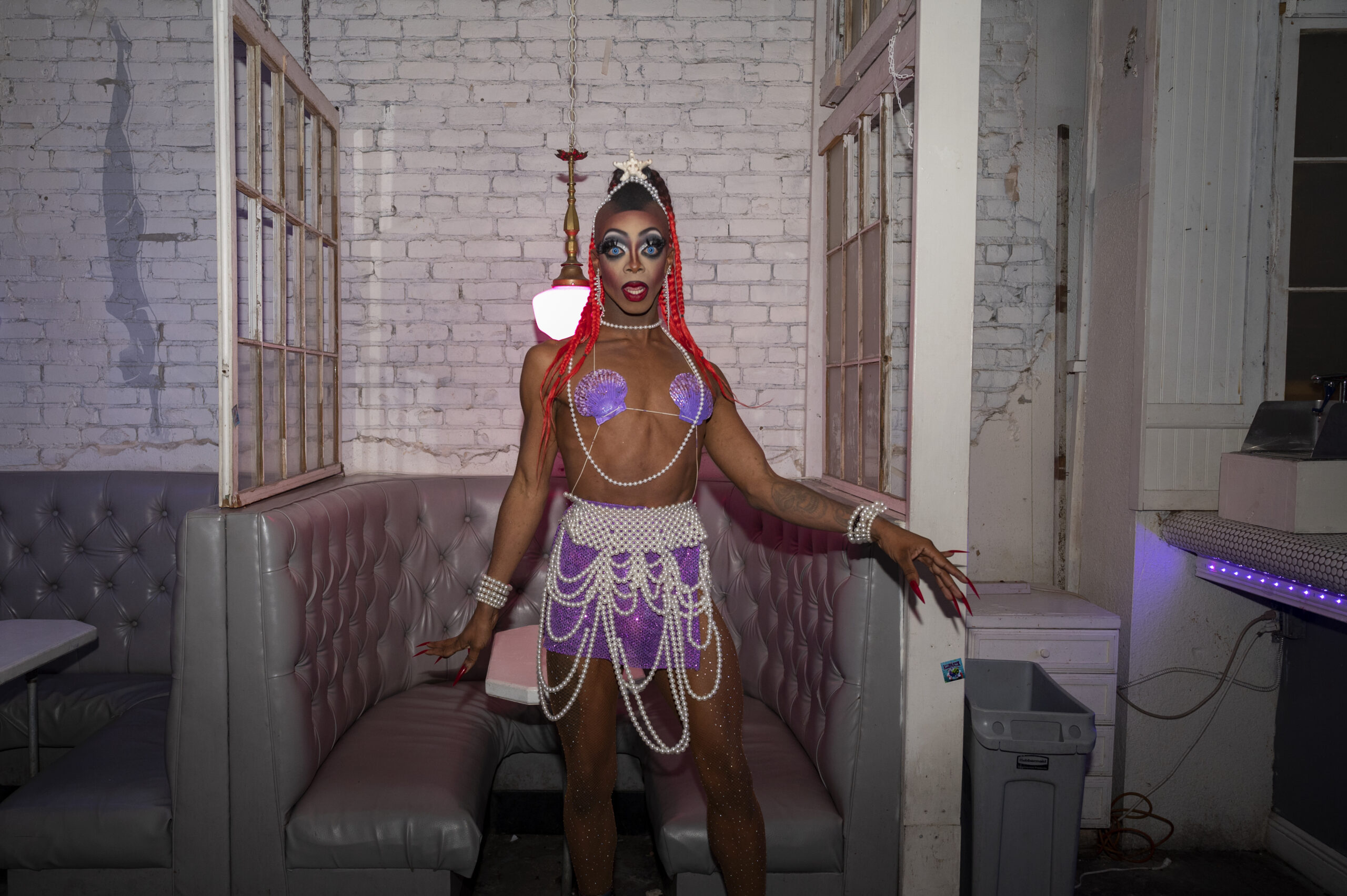
Vanguard, she explained, serves as a “declaration and celebration of queer freedom, queer love, queer existence and queer solidarity.” The space she has created is often politically charged. Each night, she recounts the latest legislative attacks on queer rights, urging her audience to get involved. Tuesday’s routine culminated in her holding aloft the severed head of former President Donald Trump and hurling it into the audience (a similar stunt that earned comedian Kathy Griffin public censure shortly after Trump’s election).
The members of Vanguard represent an evolution in drag. While elder performers were often cisgender, gay men, many of today’s queens are transgender or nonbinary and explore their identity through the art form.
Austin’s drag scene is thriving: From the heart of downtown to the Hill Country, patrons can attend events every day of the week, including late-night revues and brunches on weekends. One monthly show highlights new, amateur queens, another the elders of the community. Drag has made inroads in non-LGBTQ+ spaces as well—queens frequently perform at birthday parties, fundraisers, and, last year, at a new student orientation at the University of Texas at Austin.
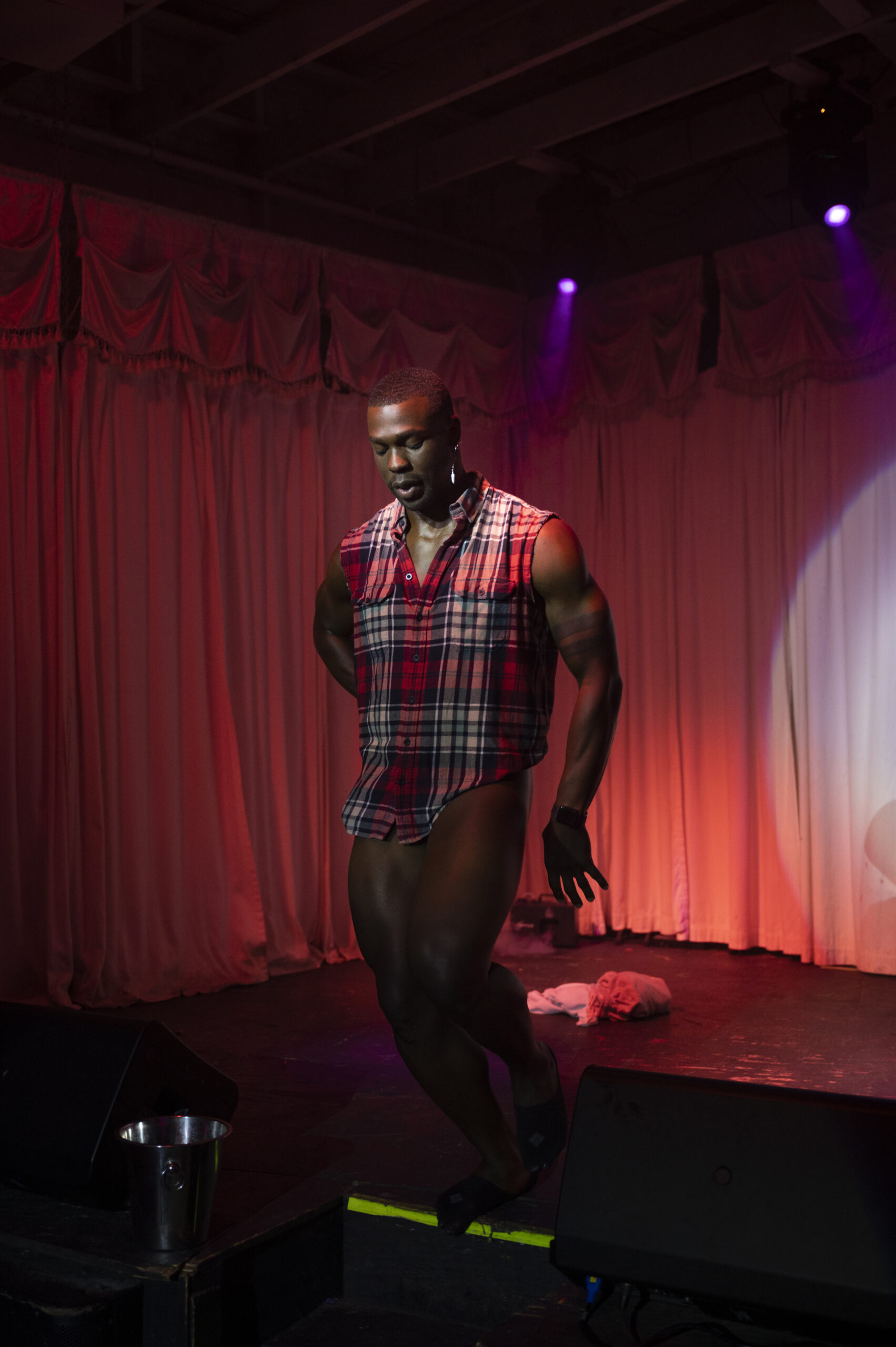
At the same time, drag is under attack. Senate Bill 12, scheduled to go into effect September 1, will levy fines against venues that host performances appealing to an ill-defined “prurient interest in sex” where minors are present; performers could also face up to a year in jail. The legislative affront goes hand-in-hand with protests and harassment from right-wing activists outside of nightclubs and on social media, where drag performers are frequently doxxed. While most performers remain defiant in the face of oppression, the growing pressure leaves them concerned for their future.
(Editor’s Note: As of September 18, 2023, SB 12 is under a temporary restraining order while a judge rules on a lawsuit led by the ACLU of Texas.)
Hermajestie began performing professionally in 2019 after moving to Austin but felt drawn to the stage from an early age.
“Technically, I have been doing drag since I was lip-synching when I was three and four years old to my mom’s CDs: Mariah Carey and Whitney Houston and Chaka Khan,” she said.
She explained that drag allows her to explore who she might have been without childhood trauma. While Hermajestie describes herself as “shy and reserved” offstage, drag allows her to express herself “without any rules or boundaries.”
“I was conditioned, being queer and Black, raised in rural Texas … to be a Black boy that was not intimidating or threatening,” she said. With drag, “I was given spaces to explore the real me, not the me that I had to be in order to stay alive.
“Drag is so healing,” she added.
I was given spaces to explore the real me, not the me that I had to be in order to stay alive. Drag is so healing.
Hermajestie started the Vanguard troupe in 2020 with financial support she was able to secure in the wake of the Black Lives Matter protests. Then the pandemic hit, which forced her to perform at outdoor venues like rooftop bars. But lockdowns and social distancing also sparked creativity for people who were stuck at home while receiving a short-lived additional income from the government.
“People had time to sit around at home and just create art,” she said. “It was just a time where we could do what humans are supposed to be fucking doing.”
Another member of Vanguard, Amber Nicole Davenport, has earned herself the informal title of “the Legs of Austin.” A tall, transgender Black woman, Davenport has “always felt like a girl.” She started doing drag in 2015 to explore her gender in a way that was acceptable to her family.
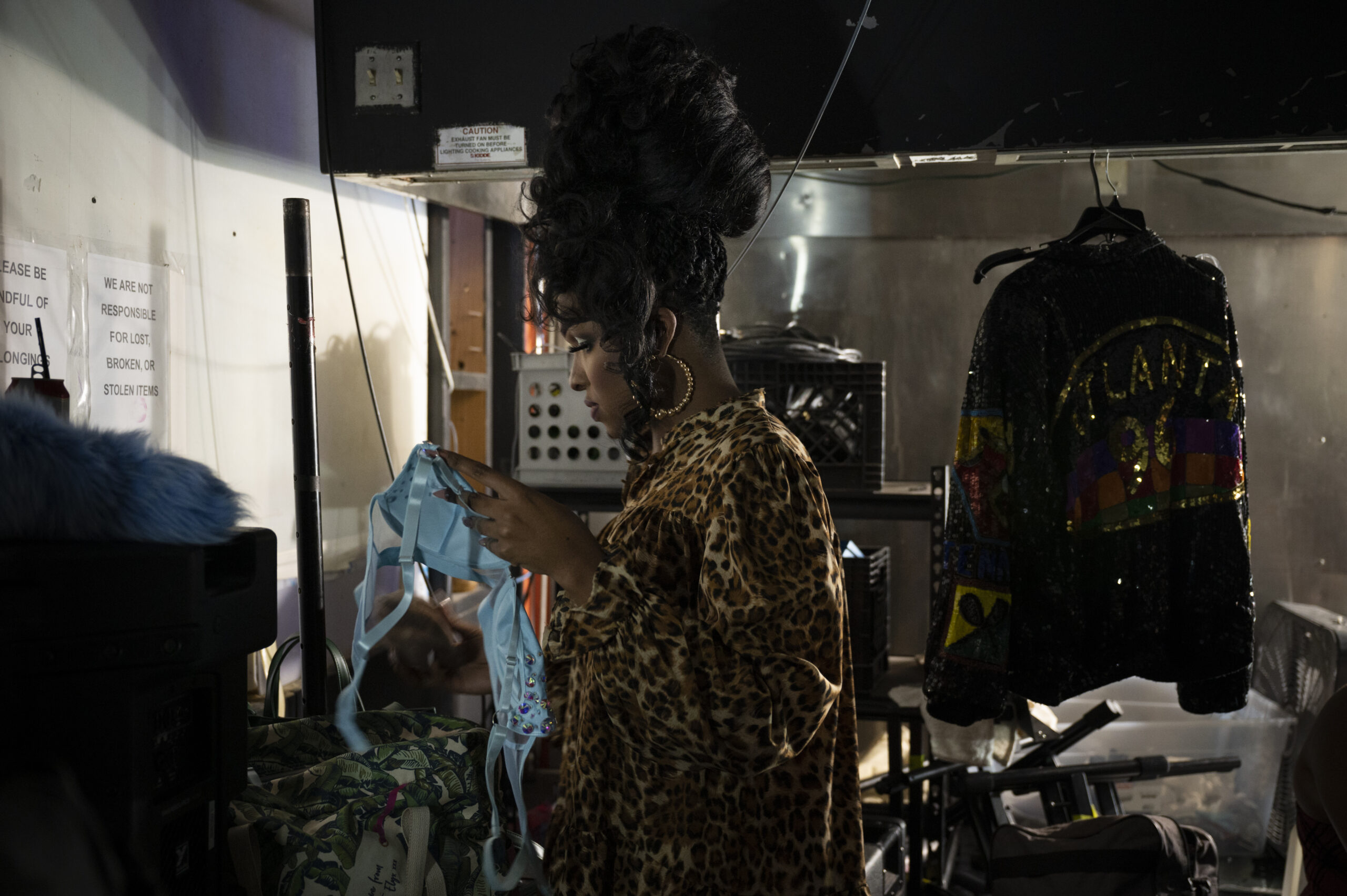
“When I was growing up, that’s when [RuPaul’s] Drag Race started,” Davenport remembered. “So VH1 was on and my grandma called me into the room and told me, ‘Sit down and watch, this is what you’re going to be.’”
Davenport explained that drag is often how people find “other families” when their birth families won’t accept them. But Vanguard’s shows are also a place to showcase queer, Black identities.
“Here, you’re able to take as much time as you need to perfect your craft behind stage and then go out on stage and present who you are as aesthetically and authentically,” she said.
Another queen who stayed busy during the pandemic was Brigitte Bandit, a white performer who wears massive prosthetic breasts that have earned the nickname “the Double Dees of Austin.” Bandit works for Extragrams, a local “drag delivery” service that launched in March 2020, which allows you to hire a performer for private events.
“You could order a socially distanced ‘drag telegram,’” Bandit explained. “I was performing in people’s front yards all over Austin.”
Bandit has appeared everywhere from traditional drag revues to birthday parties and Drag Queen Story Hours. They say they make adjustments to their wardrobe at events where young kids are the target audience. The giant exposed fake breasts stay home, but the colorful costumes and makeup remain.
“[Republicans] think drag is inherently sexual, therefore there’s always a ‘prurient interest in sex’ no matter the content or what’s happening,” said Bandit, who compared youth-oriented performances to what Disney princesses do at that company’s theme parks. “It’s just like seeing somebody larger-than-life and like a character of some sort.” Bandit recalled a memorable outdoor performance at Rock the Park, an outdoor event sponsored by public radio station KUT.
[Republicans] think drag is inherently sexual, therefore there’s always a ‘prurient interest in sex’ no matter the content or what’s happening.
“It was literally like a sea of children and I was trying to perform and I thought I was going to trip over them because I could not move,” she said.
Davenport defended the right of queens to perform where kids are present, noting that they give LGBTQ+ young people much-needed role models. “Kids should be able to see themselves in someone,” she said. “We’re not going to do the same performance at a nightclub that we would at a school.”
At 67 years old, Topaz—another frequent Vanguard performer—is the oldest actively performing Black drag queen in Austin. An elegant queen who evokes Tina Turner or Whitney Houston, he first started dancing in the 1980s, when drag shows served as fundraisers for victims of the AIDS crisis. Topaz said drag can be enjoyed by anyone, regardless of gender or sexual orientation: “When I was growing up, the first men that I saw in drag were Bob Hope, Milton Berle, and Jack Lemmon.”
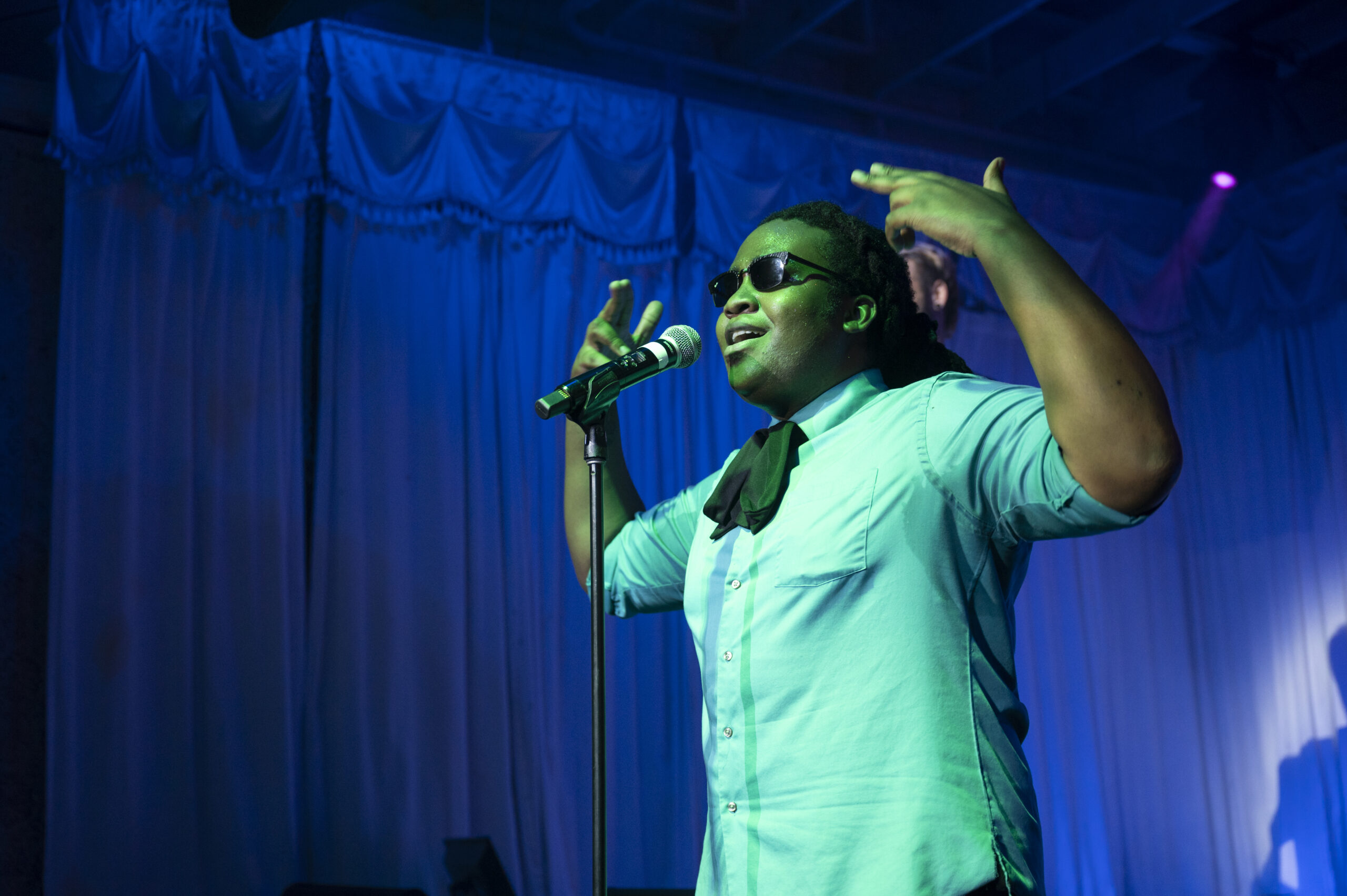
Perfectly coiffed and made-up, drag queens performed at venues just blocks from the Texas Capitol, where legislators had met to consider SB 12, which prohibits minors from attending performances that exhibit a “prurient interest in sex”—a category so broad and vague it can as easily apply to Hooters waitresses and the Dallas Cowboys Cheerleaders as to drag performers. The law also targets the use of “accessories or prosthetics that exaggerate male or female sexual characteristics.”
This provision has alarmed performers like Brigitte “Double Dees” Bandit, who uses prosthetics in her performances, but the law is written so broadly that it may as easily apply to prosthetic devices used every day by transgender people. Bandit, who is nonbinary, was assigned female at birth (AFAB), making them a rarity among drag queens, though not unheard of—drag is about portraying a highly exaggerated form of gender regardless of one’s underlying identity. The earliest versions of the drag bill banned people from performing as the “opposite” gender from the one they’d been assigned at birth. In early testimony at the Lege that went viral, Bandit pointed out that they would have been exempt.
“Whenever I’m in drag, everyone, especially the haters, sees me and thinks, ‘That’s a man,’” Bandit said. “You’d never say that if you saw me when I wasn’t in drag. You’re literally proving that gender is socially constructed.”
When the revised bill came back before lawmakers, so did Bandit. They wore a dress emblazoned with the words “Protect Texas Kids. Defend Our Kids From Gun Violence. Restrict Guns, Not Drag” along with the names of the victims killed at Robb Elementary School. Ultimately, Bandit waited 13 hours, wearing full drag makeup and costume, to have their say before the lawmakers. After delivering remarks, they refused to give up the podium until they were forced out of the chambers by Texas Department of Public Safety state troopers.
“I just kept speaking until I said what I needed to,” they told the Texas Observer. “I didn’t expect them to get the police just because I talked 15 seconds over.”
Davenport told us she only performs in 21-and-up clubs like Swan Dive, so she doesn’t think the drag ban will affect her dancing. But, as a trans woman, she does worry about the anti-trans backlash in public. Like many trans people, Davenport’s legal documents still reflect her given name, which she fears may cause others to question her gender. “Just leaving that house, someone may be like, ‘Oh, you’re doing drag,’” she said. “No, baby, I’m not doing drag. I’m living my life. I’m walking down the street being the lady that I am.”
The extremist anti-LGBTQ+ group Protect Texas Kids, which has mobilized some of the state’s most virulent anti-drag protests, published Bandit’s real name on social media in June to encourage harassment. Bandit said Extragrams has lost some repeat customers, who have cited safety and legal concerns. Venues have canceled a handful of shows. But Austin has been spared the worst of the anti-drag demonstrations seen in other cities, where white supremacists have performed stiff-armed Nazi salutes outside a few clubs.
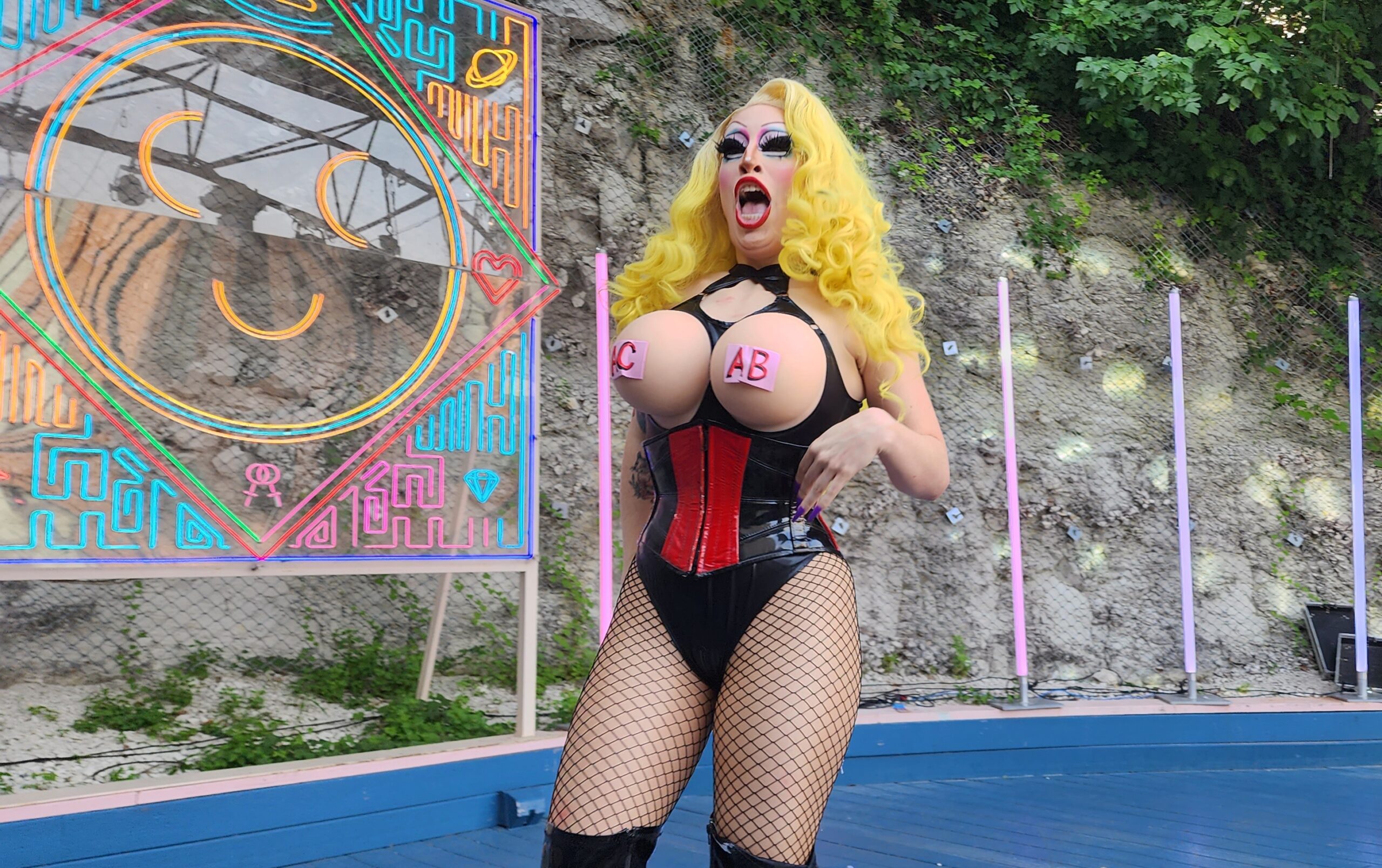
Community members, including antifascist groups and the organization Veterans for Equality, have provided protection at spaces hosting drag events. Bandit, like many queens, trusts community volunteers more than law enforcement, which historically has had an antagonistic relationship with the queer community.
“They understand we don’t really want a police presence, but we do need some kind of security,” Bandit said.
In August, Bandit became one of five plaintiffs in the ACLU of Texas’ lawsuit against SB 12; Extragrams is another. Citing the threats she and other performers have faced, she said the legislation had already contributed to a chilling effect on the free speech of drag queens and kings in the state.
Bandit sometimes performs in a Dolly Parton costume, a look that involves stuffing her bra to make her chest look larger. Although this use of prosthetic body parts may be considered illegal under the new law, she doesn’t consider dressing up as Parton to be inherently sexual or inappropriate for children. After all, Parton herself has become known for her philanthropy, which often includes reading and giving books to kids.
“So I can’t perform as Dolly Parton in front of kids like Parton can perform in front of kids?”
So I can’t perform as Dolly Parton in front of kids like Parton can perform in front of kids?
Speculating on the potential effects the law could have on trans and nonbinary people’s ability to give artistic performances and express themselves, Bandit concluded, “They’re trying to ban queer expression from public life, so it’s not just going to affect drag performers.”
All the queens we spoke with said they intend to keep performing, even after the law goes into effect.
“Oh, I’m not going to stop,” Topaz said. “I’ve been on the planet since before the politics and they ain’t stopping me now.”
At another Tuesday night Vanguard drag revue on May 30, just days before the final passage of SB12, Hermajestie cavorted, crawled, and mimicked swimming on stage in a shimmery mermaid costume. She danced to “Thirsty” and “Wishes” by Ophelia Cache, at one point holding an oversized prop fork—a reference to Ariel in Disney’s The Little Mermaid, whose live-action version was then in theaters. A sign language interpreter rapidly kept time to the lyrics as Amber Nicole Davenport, her hair in a gravity-defying updo, stripped down to a blue lingerie set accentuated by matching blue faux-fur fox tails. That night featured eight drag queens and kings, all Black, in a showcase of the city’s finest talent.
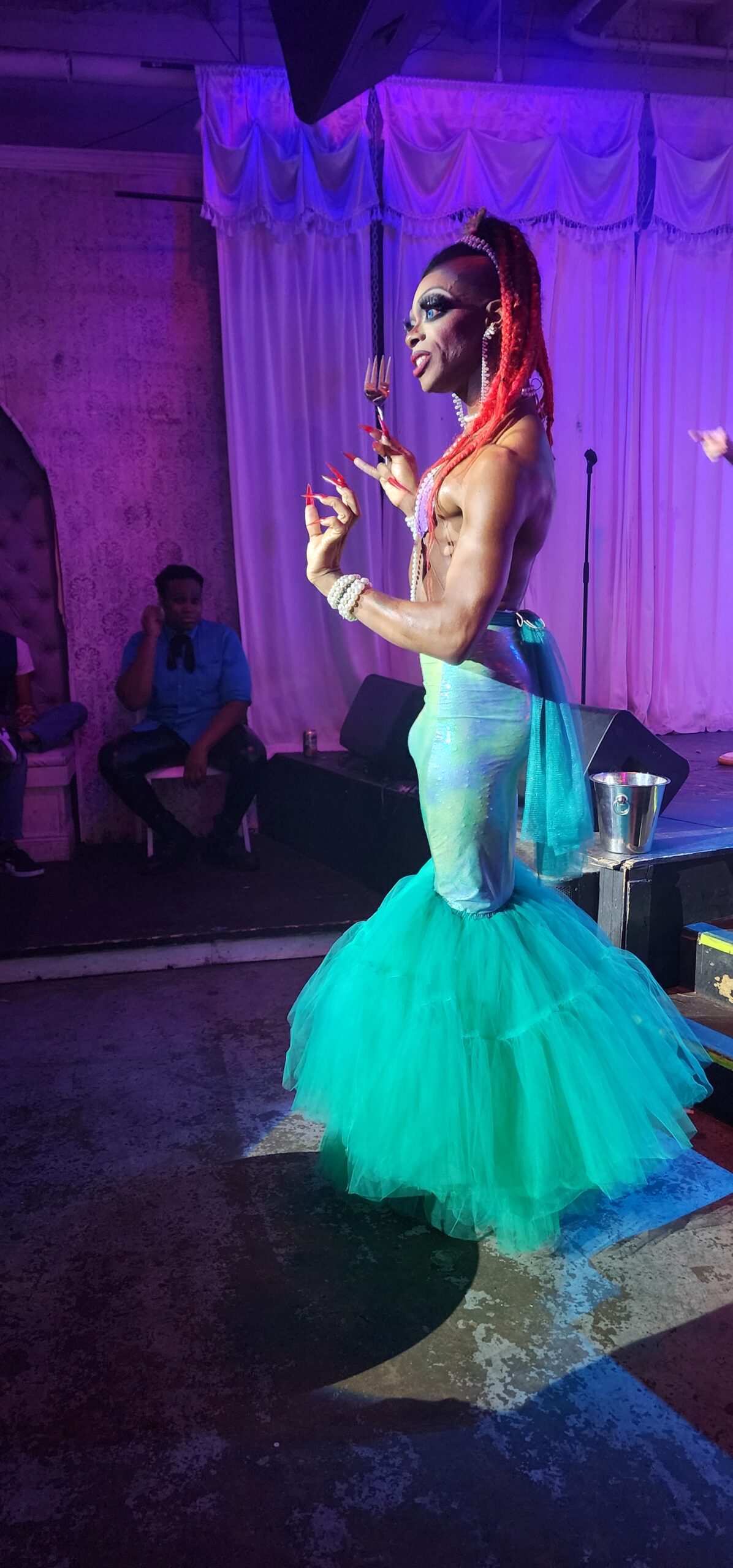
Hermajestie is bold, opinionated, and strong—which is why it came as such a shock when she suddenly left town, moving almost overnight to Washington state days after that final Vanguard performance. Although hundreds of people came out to testify against the drag ban, she feels more people should be speaking out nationwide, given the severity of the attacks on the ability of LGBTQ+ people to exist in public.
“I honestly don’t understand why there is not a more extreme reaction from everybody everywhere,” she told us. “This blatant violation of human rights is absolutely disgusting.”
She knew it was time to “retreat” and let others continue her work.
“I’ve been in Texas my whole life and being queer and Black in Texas is like existing under constant attack,” she said. “I’m also a parent, so I have to be able to look my child in the eyes and tell them that I have done everything in my power and ability to keep them safe. And I kind of feel like I can’t offer my child safety in Texas. … I think about Uvalde every day.”
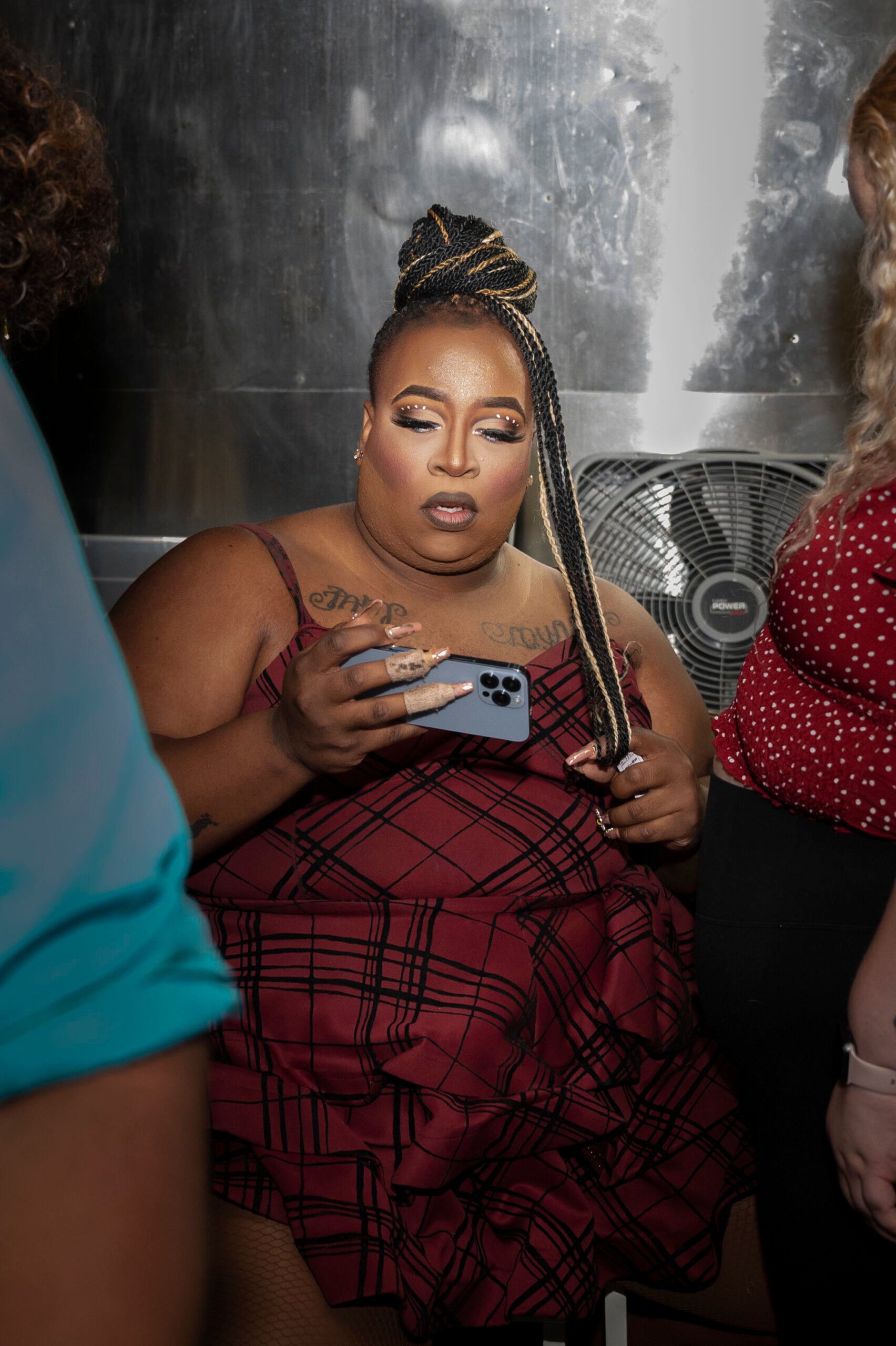
While Hermajestie looks for Washington clubs to perform in, drag continues at the Swan Dive, but in the hands of Diamond Dior Davenport (Amber Nicole’s “drag daughter”), who also hosts Melanin Magic, another regular revue featuring non-white queens.
“I still want to keep some of the values [of Vanguard] because I believe so strongly that we need spaces for the POC community,” Davenport said.
While she admitted feeling uncertainty about the future of the community under the drag ban, she said she expected it to be halted by the courts, as similar bills have been in Tennessee and Montana. “You’re quieting voices, taking away our freedom of speech, taking our art,” she said.
